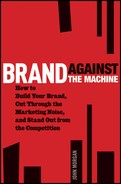31
Longing to Belong
DO YOU REMEMBER all those silly high school cliques, the ones we were desperate to be a part of and made life horrible when they wouldn't let us in? That need to belong has been instilled in all of us since a very early age. We all want to feel like we are a part of something. Everyone wants to feel like they belong.
There's not a person on earth who isn't looking for their place. That place where it's okay to be yourself because you are with others just like you. I've always felt like being an entrepreneur is very lonely, so when I find myself surrounded by other like-minded entrepreneurs, I feel at home. We're on the same page. We can talk about the same things. There's an understanding and connection with each other based on our commonality, even if the rest of our lives are at polar opposite ends of the spectrum.
Your fans, audience, or whatever you want to call them, all have that longing to belong. They want to be a part of something that is fun, exciting, and has a real sense of community. Have you ever noticed how motorcycle drivers almost always wave at other motorcycle drivers or how drivers notice others with the same make and model of car? They don't even know each other, yet there is a connection. That connection is based on the commonality and significance of liking the same thing.
Harley Davidson has an enormous number of fans. Not only are these fans super passionate, but they also want to hang around with other Harley Davidson fans. They organize their own events and trips that all evolve around one common factor: They are all Harley Davidson fans.
Am I saying you want to establish a cult-like following? Yes and no. If by “cult” you mean a passionate fan base and a strong following, then the answer is most definitely “Yes.” If by “cult” you mean people getting together to wear creepy robes, drink blood, and/or paint satanic images on the floor, then the answer is a resounding “Hell, no.”
You want to align yourself with your audience and create a strong feeling of “us.” People should feel a bond with you like they are a part of something bigger than just themselves.
When your audience sees that you share the same values as they do, you begin to build a level of trust with them.
Nothing creates a stronger bond than an “us versus them” mentality. You want to create a feeling that they are part of a larger “us.” Position your brand and its fans as being against “them.” I'm doing it with you in this book, right now. Those of us who “brand against the machine” do things differently. We're fed up with the boring ways businesses market themselves.
We are the cool people. “They” are not.
One great way to establish this sense of community is to give your fans and followers a name. A name gives them an identity and separation from the status quo that increases a sense of community and the feeling of belonging.
Let's look at a few examples. One of the most popular examples of naming your fans is from the band The Grateful Dead. The people in their passionate fan base are known as Deadheads. Deadheads even invented their own language and slang. You know a fellow Deadhead by the language they use. Creating a language that only you and your fans use builds a super tight bond that is very hard to break. Even former President Bill Clinton and legendary basketball coach Phil Jackson are Deadheads.
Jimmy Buffet fans are known as Parrotheads. Fans of pop singer Lady Gaga are known as her Little Monsters. (To show her dedication to her fans, Lady Gaga even got “Little Monsters” tattooed on her arm.) One of my favorite rock bands, Better Than Ezra, affectionately refers to their fans as Ezralites. And finally, the hit TV show Mad Men certainly has a loyal fan base. They are known as Maddicts, and I'm proud to say I'm one of them. I love that show.
Members of my community are known as Outcasts because they are going against what is normal and common. As a reader of this book I now consider you an Outcast. Welcome to the club!
When a community has a name, it becomes easier and more natural for them to refer to themselves as such and to talk about it to other people. It allows people to feel like they are a part of something important. You're either in or you're out. You are either cool or you are lame. There is no in-between.
People love to be a part of a movement, so why aren't you creating a sense of belonging with your audience? Why not let them be a part of your own movement?
